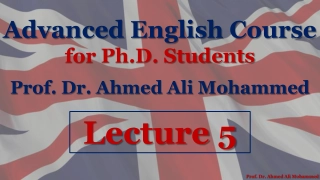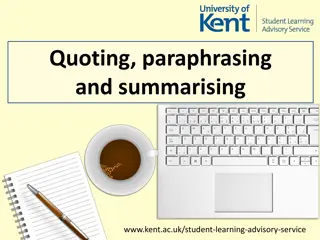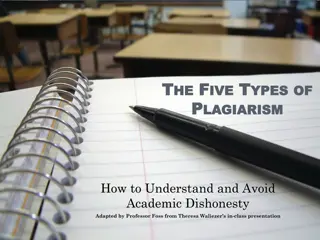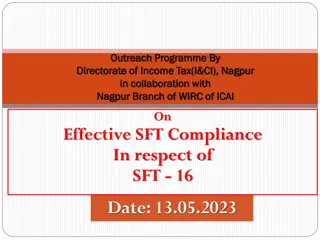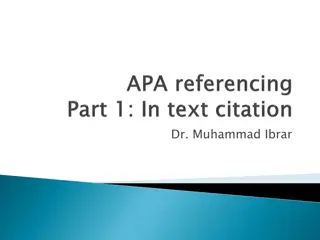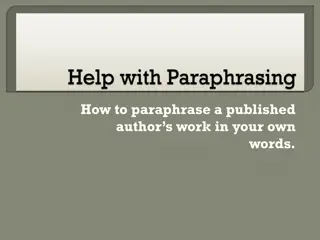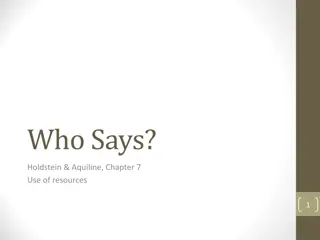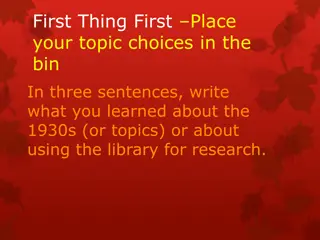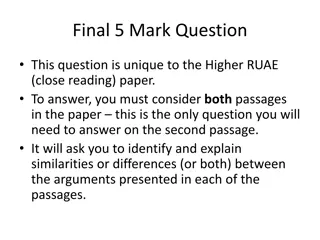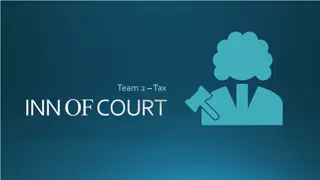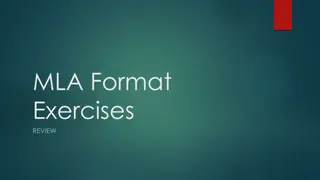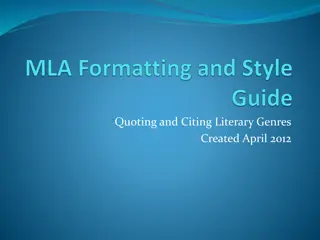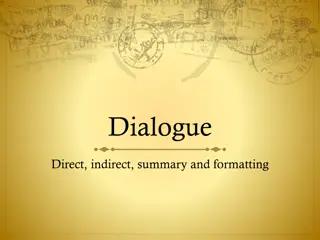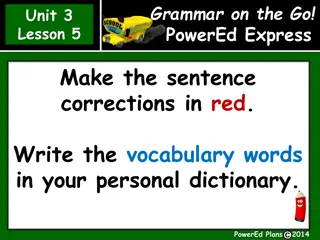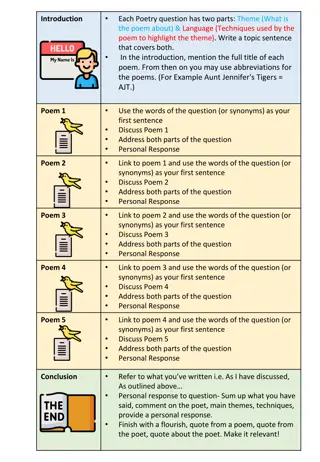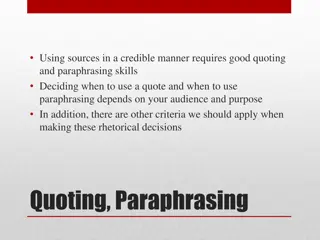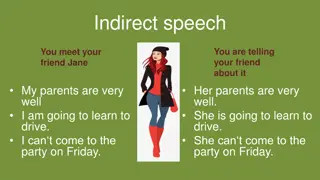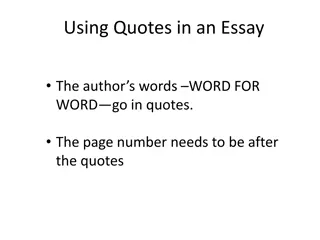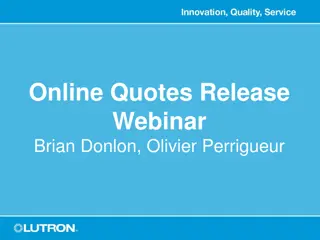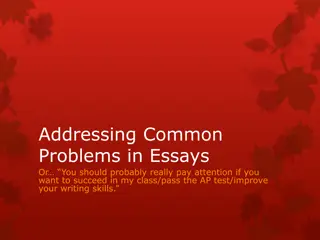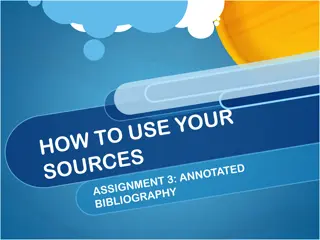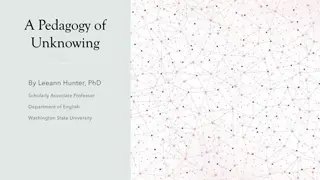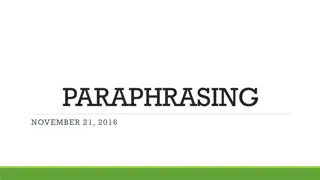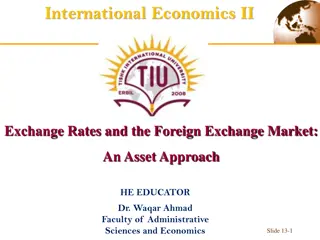Advanced English Course for Ph.D. Students
Prof. Dr. Ahmed Ali Mohammed's lecture on paraphrasing and quoting in academic writing. Learn strategies to develop paraphrasing skills and understand the purpose of paraphrasing in research.
0 views • 15 slides
Mastering Quoting, Paraphrasing, and Summarizing Skills in Academic Writing
Understanding the importance of quoting, paraphrasing, and summarizing in academic writing, this tutorial explains when and how to use each method effectively. Quoting involves repeating exact words for crucial definitions or evidence, paraphrasing focuses on using your own words to convey understan
0 views • 14 slides
Understanding Links in Textual Content
Learn how to identify and analyze links between ideas in a text by examining how specific sentences provide connections. Follow a structured approach of quoting, explaining, and analyzing words that link backwards and forwards to establish a clear understanding of the text's coherence.
2 views • 21 slides
Understanding and Avoiding Plagiarism: Types, Consequences, and Prevention
Understand the five types of plagiarism, from intentional to unintentional, and learn how to identify, avoid, and properly cite sources to prevent academic dishonesty. Explore techniques for paraphrasing, quoting, and documentation styles like MLA and APA to ensure academic integrity.
5 views • 12 slides
Compliance Obligations and PAN Requirements for Financial Transactions
This outreach program by the Directorate of Income Tax in Nagpur, in collaboration with the Nagpur Branch of WIRC of ICAI, focuses on effective compliance with Statement of Financial Transactions (SFT). It covers PAN compliance obligations, forms, and penalties for non-compliance related to specifie
0 views • 14 slides
Mastering Source Citation Techniques for Research and Assignments
Explore the essential elements of referencing styles, including in-text citations and reference lists. Learn how to credit sources properly, cite ideas and theories, and direct readers to full source details. Understand the rules for citing authors, quoting specific parts, and referencing multiple a
2 views • 12 slides
Effective Techniques for Paraphrasing Academic Work
Paraphrasing published author's work requires time, understanding, and persistence. Recognize the distinction between quoting and paraphrasing, emphasizing the importance of citations. Avoid excessive quoting in social sciences, preferring paraphrasing. Spend ample time reading and discussing ideas
0 views • 23 slides
Effective Use of Sources in Academic Writing
Utilizing resources effectively in academic writing involves proper use of summarizing, paraphrasing, quoting, and selecting among these techniques based on importance. It is essential to avoid patchwriting, maintain clarity, and ensure the original work's integrity while crafting your argument.
0 views • 6 slides
Understanding Plagiarism and Proper Citation Techniques
Plagiarism is a serious academic offense that involves using someone else's work without proper acknowledgment. This includes copying text from the internet without citation or failing to use quotation marks when quoting an author. It is important to cite sources correctly, even when summarizing or
0 views • 38 slides
Analyzing Agreement and Disagreement in High School RUAE Passages
This task involves identifying and explaining similarities or differences between arguments presented in two passages for the Higher RUAE (close reading) paper. The focus is on recognizing key areas of agreement or disagreement and providing supporting evidence from each passage to earn marks. Tips
1 views • 17 slides
Quoting Ralph Waldo Emerson: A Chief Justice's Perspective on Tax Court Consistency
The Chief Justice of Canada's Tax Court referenced Ralph Waldo Emerson's famous quote in a judgment, highlighting the significance of avoiding foolish consistency. This insight offers a unique viewpoint in the world of tax jurisdiction, emphasizing the value of voluntary and self-assessed approaches
0 views • 50 slides
Understanding Paraphrasing, Summarizing, and Direct Quoting for MLA Style
Exploring the differences among paraphrasing, summarizing, and direct quoting in MLA style. Paraphrasing involves rewriting in one's words, summarizing captures main ideas concisely, and direct quoting requires identical replication. These methods add credibility, support arguments, and serve variou
0 views • 6 slides
MLA Format Exercises Review
This document provides exercises on in-text citations, works cited entries, quoting, the use of brackets, slashes, and ellipsis in MLA format. It includes examples and practice exercises for each component to help improve understanding and application of MLA citation rules.
0 views • 7 slides
Modern Language Association (MLA) Guidelines for Quoting and Citing Literary Genres
Learn how to properly quote and cite literary genres following the MLA Handbook for Writers of Research Papers. Explore guidelines for citing authors in parenthetical citations and incorporating prose quotations into your text, including handling question marks and block quotes.
0 views • 16 slides
Mastering Dialogue: Direct, Indirect, Summary & Formatting
Good dialogue should be believable and distilled, conveying the essence of conversations without filler. Direct quotations are used for critical moments, while indirect speech allows characters to speak freely without quoting verbatim. Dialogue can set the mood, advance the action, and reveal charac
0 views • 10 slides
Grammar on the Go! PowerEd Express Unit 3-5 Sentence Corrections & Punctuation Tips
Improve your grammar skills with this lesson on correcting sentences and using proper punctuation. Learn about sentence types, capitalization, quoting dialogue, and more. Enhance your writing and communication abilities with insightful tips and examples.
0 views • 11 slides
Crafting Literary Analyses: Study of Poetry Themes and Language Techniques
Explore an insightful approach to analyzing poetry themes and language techniques through a structured paragraph template. Delve into five poems, dissect their themes and techniques, and craft personal responses to each piece. Uncover the beauty of poetry with a systematic examination that includes
0 views • 4 slides
Effective Use of Quoting and Paraphrasing in Academic Writing
Learning when to quote and when to paraphrase in academic writing is crucial for credibility. Quotations should be used sparingly, with attribution and relevant introductions. Signal verbs like acknowledges, claims, and more enhance attribution. Citing sources effectively adds credibility to your wo
0 views • 12 slides
Understanding Indirect Speech: Examples and Practice
Indirect speech involves reporting what someone else has said without quoting them directly. In this content, you will find examples and exercises on how to convert direct speech into indirect speech, covering statements, commands, and requests. Practice transforming sentences like "My parents are v
0 views • 8 slides
Mastering Quoting in Essays for Academic Excellence
Learn the nuances of using quotes in essays by embedding them correctly and avoiding common mistakes. Understand the significance of attributing quotes to authors and incorporating page numbers in academic writing to enhance credibility. Explore examples and tips for effectively tweaking quotes when
0 views • 14 slides
Enhancing Operational Efficiency and Collaboration in Project Management
This content provides insights into the changes happening in the online quotes release webinar organized by Brian Donlon and Olivier Perrigueur. It discusses aligning CRM and quoting tools, standardizing project naming conventions, and identifying primary influencers. Additionally, it explores the b
0 views • 12 slides
Tips for Effective Synthesis Essays
Avoid common pitfalls in synthesis essays by ensuring sources are credible, not relying too heavily on quoting, and truly integrating sources into your argument. Learn to synthesize information effectively to enhance the strength of your argument and showcase your understanding of the topic.
0 views • 36 slides
Mastering Quoting Techniques in Academic Writing
Learn when to quote, summarize, use ellipses, brackets, and punctuate quotations effectively in academic writing. Explore examples and guidelines for maintaining accuracy and integrity while incorporating direct quotes and paraphrased content in your work.
0 views • 12 slides
Jesus Overcomes Temptation in the Wilderness According to Luke 4:1-13
Jesus, filled with the Holy Spirit, faced temptation from the devil in the wilderness for forty days. The devil tried to lure Jesus with worldly power and possessions, but Jesus remained steadfast, quoting scripture and emphasizing the worship of the Lord. After enduring all temptations, Jesus emerg
0 views • 19 slides
Engaging Pedagogical Approaches for Student Well-Being
Navigating expertise, embracing the unknown, and supporting student resilience are key themes in the innovative pedagogical practices highlighted. The exploration dives into promoting student purpose, dismantling assumptions about expertise, and cultivating living classrooms. The emphasis on creatin
0 views • 14 slides
Mastering Textual Evidence: Paraphrasing Techniques and Strategies
Learn the art of paraphrasing through techniques such as replacing subjects and words, rearranging sentences, and condensing information. Understand the difference between quoting, summarizing, and paraphrasing, illustrated with examples and tips on effective paraphrasing. Remember the R.A.P. approa
0 views • 8 slides
Streamlining Freight Quoting and Management with GreenScreens Platform
Revolutionize your freight operations with GreenScreens, a powerful platform offering features like lane data analysis, quoting tools, customer rate sending, and batch quoting capabilities. Enhance efficiency, optimize rates, and win more business seamlessly in the competitive logistics landscape.
0 views • 8 slides
Understanding Exchange Rates in International Economics
Exchange rates play a crucial role in translating prices between countries and impacting international trade. This chapter discusses how exchange rates are determined, their significance in global transactions, quoting methods, and the effects of currency appreciation and depreciation on relative pr
0 views • 39 slides
